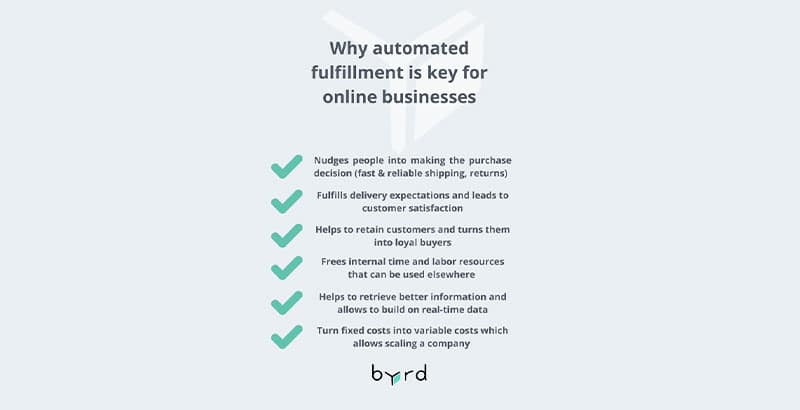Unlock online growth with automated ecommerce fulfillment
“Growth and comfort do not coexist.”
With this quote, Ginni Rometty, former CEO and Chairman of IBM, sums up exactly what thousands of online merchants are experiencing firsthand.
One of the biggest challenges that growing ecommerce businesses face is increasingly complex logistics. The good news is there are ways to take these worries off your shoulders. In this blog you will learn how automating your ecommerce fulfillment will help you optimize internal processes, reduce errors, and decrease cart abandonment.
This will eventually lead to more satisfied customers and less workload, unlocking the possibility for rapid and long-term online growth.
Why automated e-commerce fulfillment is important
Faster order fulfillment through automated processes.
In 1748, Benjamin Franklin wrote the famous aphorism “time is money.”
More than 270 years later, this is still true in regards to ecommerce and order fulfillment. In fact, speedy delivery will not make you stand out from the crowd. It has become an absolute necessity. Offering slow shipping is one of the top reasons for customers to abandon the shopping cart. 26% of cart abandonments are due to not quick enough shipping options. This naturally is a huge pain point for online merchants.
Automated e-commerce fulfillment will trigger the process of picking and packing right when a customer makes a buy- no time lost. This allows you to hand over the products to the carriers in the fastest possible time, reducing the time your order fulfillment takes.
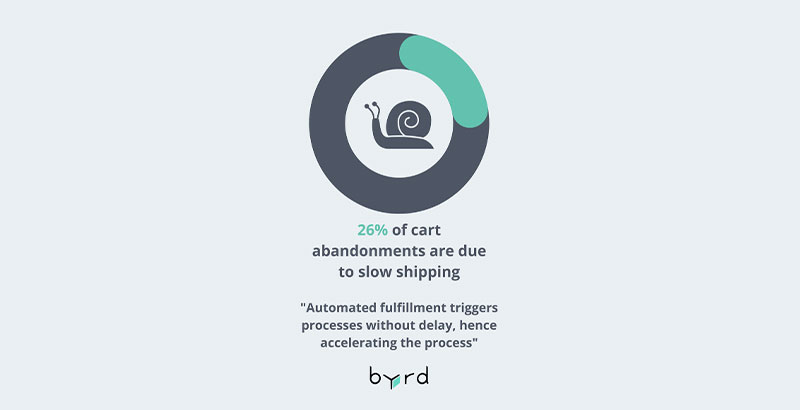
Reduce mistakes due to fulfillment automation.
You might have seen the Olympian who was leading the race but then took a wrong turn. This analogy can be used for the e-commerce fulfillment process as well. While fast shipping is a hot topic, it will not prevent you from disappointed customers when a mistake happens and they receive the wrong products. According to a survey from 2020, 23% of participants have received a wrong item.
Hence, a mistake in the fulfillment process will most likely turn a potential regular customer into one that will never visit your online shop again. To make matters worse, negative word-of-mouth, bad reviews, and additional costs for compensation are to be expected.
Automated ecommerce fulfillment, however, allows you to minimize the risk of mistakes by reducing manual data entry.
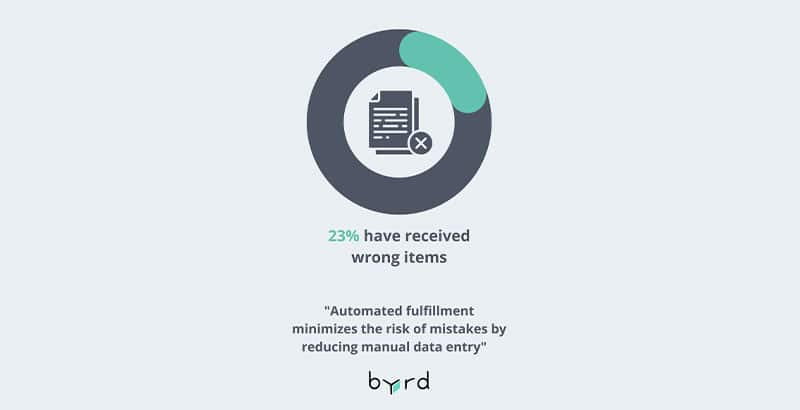
Improve customer experience through real-time tracking
Sometimes the greatest joy lies in anticipation and online shopping is no exception. Automating your order fulfillment process enables you to strengthen this feeling. It allows keeping the status of the order up-to-date at all times. Tracking the shipping is business standard and 97% expect this possibility. Yet, being able to track different stages like picking and packing will give you an edge over most of your competition. This is what a good customer experience looks like in 2021.
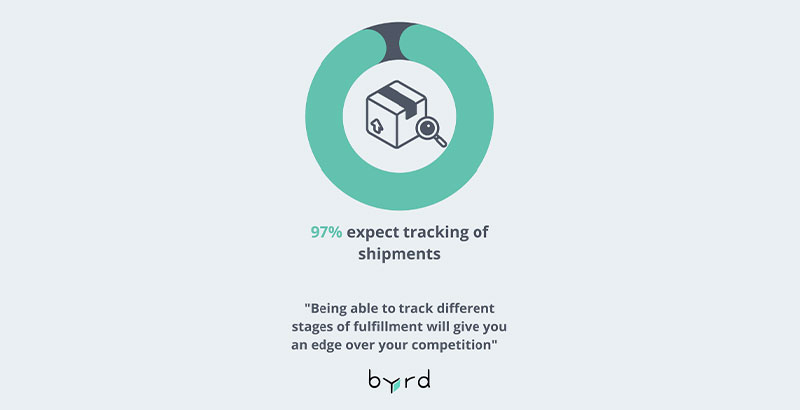
Free up your resources with automated e-commerce fulfillment.
When owning a growing e-commerce business, you’ll reach the point where you have to take the decision to work less in your company and instead focus on working on your business.
There is no doubt that order fulfillment is one of the most tedious tasks for e-commerce companies. Automating this process by outsourcing it to a third-party logistics (3PL) service provider is the decision most scaling companies take sooner or later.
This decision is reasonable in most cases. While fulfillment is a standardized process, creating marketing campaigns that fit your brand, improving your products, and talking to your customers is rather difficult to outsource. Automating your e-commerce logistics will, therefore, allow you to focus on more important business areas in order to increase your sales.
Simplify data analysis
Automating the order fulfillment process does not only simplify the daily operations. It also allows you to have access to a vast amount of data at hand at all times. Building on these insights is key to detect and prevent inefficiencies and bottlenecks. According to McKinsey, data-driven companies are 19 times more likely to be profitable. Be one of them.
Peak season readiness – Get ready by automating your logistics process.
Building on data collected throughout the years in combination with faster and less error-prone processes will get you prepared for shipping peak season. The Christmas season, for example, is key for most e-commerce companies. Other online merchants rely on promotions or flash sales. That means that big amounts of orders will be generated within a short period of time. That is why your fulfillment set-up can be a decisive factor to make or break a successful business year.
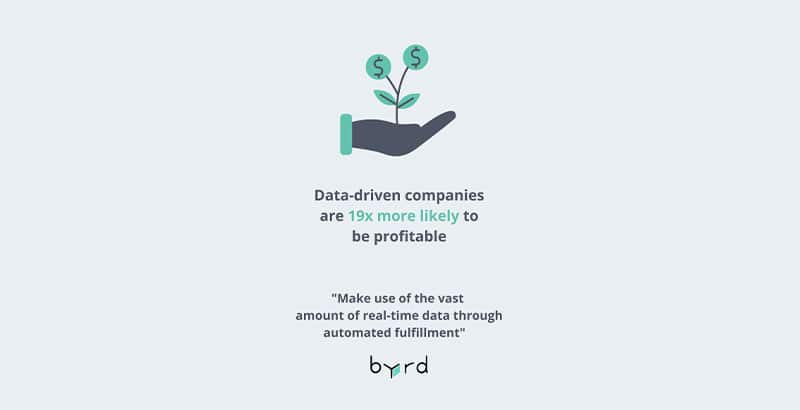
Additional advantages when using a 3PL to automate your e-commerce fulfillment.
Turn fixed costs into variable costs
When growing their business many online merchants focus on sales and turnover only. While scaling these numbers is great, you should never forget about your cash flow. Michael Dell, the founder of Dell technologies, once compared this to watching the speedometer only, while running out of gas. So, it comes as no surprise that in 2021, 82% of new company failures are due to cash flow issues.
One strategy that supports maintaining a positive cash flow is to turn fixed costs into variable costs. Automating your e-commerce fulfillment with the help of a 3PL fulfillment provider allows you to do that. Instead of paying a fixed amount for labor, equipment, infrastructure, and similar, most of these fulfillment companies will charge per sale only.
That way, you can make sure that even a rapid growth of online sales will not get you into trouble financially.
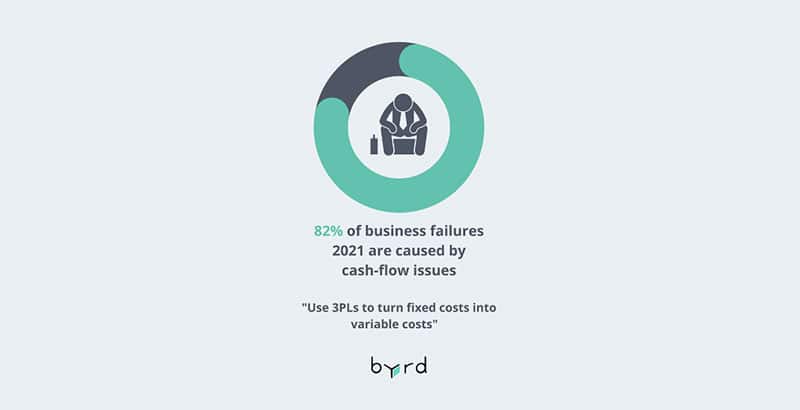
Scalability through outsourcing your fulfillment.
Scalability, today, is a big buzzword in the start-up environment. It is equally important for established e-commerce companies that plan on growing their online business. Automated order fulfillment is one of the pillars that allow to double, triple, and quadruple sales within a relatively short period of time.
Again, outsourcing logistics is the simplest way to automate order fulfillment. Additionally, no big investments for software, warehouses, equipment, and similar are needed. 3PLs are experienced in dealing with customers with a growing amount of orders.
Setting up your own fulfillment center is cost and time-intensive and comes along with a great deal of risk. On the one hand, you are at risk of not hitting your ambitious sales targets and are still left with high costs. On the other hand, there is the possibility that your sales increase rapidly, meaning you could potentially outgrow your warehouse capabilities sooner rather than later. This, in turn, would lead to the need for another investment. Money that should be used to keep the momentum up.
The downside of automated order fulfillment.
Less control
Automation unavoidably goes hand in hand with less control. At least less perceived control. The parcels won’t go through your hands anymore, and if you opt for cooperating with a 3PL fulfillment provider you won’t even have to have a look at your inventory physically anymore.
This is why the decision of whom to work with comes close to making the choice of whom to marry. Choose a fulfillment company that is transparent and provides live data on inventory, handling and turnover rate, and similar. Partnerships between e-commerce companies and 3 PLs are usually long-term collaborations, hence trust is an extremely important foundation of successful cooperation.
Also, communication is key. For instance, it is of utmost importance to let your fulfillment service provider know beforehand when you plan to run a sales promotion. That way they can make sure to be prepared for an increased workload.
Conclusion
Automated fulfillment has turned into a key domain in online business. It is essential to convince potential customers to make a buying decision, fulfill their orders to their satisfaction, and retain them as regular customers.
At the same time, automated fulfillment allows using internal time resources where it is more important. Additionally, automation in the logistics process allows to collect and retrieve more and better information and build on real-time data to make well-informed decisions.
Furthermore, automating your logistics by outsourcing it to a 3PL like byrd will allow you to turn fixed costs into variable ones, which could be a key benefit for scaling companies. Whatever you do next, if you plan on increasing the number of sales, eventually there will be no way around automating your fulfillment process.
